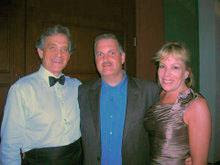Classified ads are everywhere!
You see them when you read your favorite ezine. You see them on all the search engines in the form of pay per click ads like Google AdWords. And you see them on blogs and forums too! The reason you see so many classified ads in ezines, on web sites and other places is simple.
They work!
Classified advertising is one of the most cost effective forms of advertising on the Net today. Like most things that seem very simple on the surface, a great deal of work goes into writing a powerful classified ad.
If you want to add power to your classified ads, carefully consider the following four step process. Writing a great ad is hard. This is not "sit down for 5 minutes and punch it out" work. When a professional writer creates a classified ad for a client, it's not unusual for the writer to produce 15 or even 20 variations in order to get the best possible ad. So grab the beverage of your choice, loosen up those typing fingers and let's create a money making classified.
The three parts of a great classified ad are ... * The Headline* The Body* The Call to Action IMPORTANT: Each one has only ONE purpose.
* The purpose of the headline is to sell the ad.
* The purpose of the ad is to set up the call to action.
* The purpose of the call to action is to sell the click.
If you keep this in mind as you write, you will see how easy it becomes to cause readers to take the action you want. =======>
The Headline Your headline must grab attention! The headline's job is to sell the ad. Some people use sensational headlines with no relationship to their offer to grab attention. That approach may work in the short term, but damages your integrity in the long run. Honesty is always the best policy. The last thing you want is disappointment when someone arrives at your website. Keep these ideas in mind when you write your headline. * Begin each sentence with an action word.* Create curiosity.* Ask a question. HOT TIP: If the publication you are placing your ad in doesn't allow headlines, use the first few words as the headline or indent the ad so it stands out. When writing headlines, always remember that people care about exactly one thing; what's in it for me? =======>
The Body The body of the ad must tell your reader what's in it for them. What *benefit* will they get by making that click? People don't want to 'learn more' out of idle curiosity. They want to learn more in order to get to the *benefits* you promised them, so don't be shy about what your offer will do for them. The first step to writing the body is to list all the features of your product or service then, next to them, list the benefits of those features. You must write at least one benefit for each feature, or don't use that feature. People buy what your product or service will do for *them*, not only what it will do. =======>
The Call to Action The call to action is the action you want the reader to take. While it is often as simple as "click here" it's wise to pay careful attention to this step. What to say here depends on if you are sending them to a web site, an autoresponder, or some other way to get more information. If it's a website, be sure to include urgency. You must lure them away from what they are doing now in order to visit your site. If you are using an autoresponder, tell the reader what to expect. Will they get one email, a five part series, or something else? The more they know, the more likely they will be to click through. =======>
What's Next? One last step and you're ready to begin making money. Don't forget to read your ad! Classifieds aren't supposed to read like a novel. Check that spelling too! Once you have your dollar grabbing, profit pulling classified written, don't forget the #1 rule inadvertising.
TEST YOUR AD Test, test and test again to know what works. Testing allows you to spend small money now to make big money later. By following these steps you will begin to create classifieds that work. Once you have an ad that works, use it everywhere you can afford to and you will rake in the profits! *******************************************************
Charlie Page helps people succeed online. How can he help you? Find out now at his main site or call his toll free number. http://www.realworldtactics.com/
Helping You Find Peace and Prosperity
David Carroll 952-544-0117
http://www.thehomebusinesscompany.com/
Friday, March 21, 2008
Thursday, March 20, 2008
You Are What You Eat
The Business Dinner
More than half of all business deals are finalized over a meal, and a higher percentage of business discussion in general occurs while out to lunch or dinner. Business meals are often used to conduct job interviews, get to know a client or consultant, network with a colleague, or sign a contract.
Your professional polish is on display. What you order, how you eat, and what you discuss demonstrate your courtesy, poise, and respect for others, so never assume people won't notice or will tolerate poor manners.
Have you ever had a lunch or dinner meeting with a business associate whose manners were sub par? Perhaps she brushed her hair during the meal or he chewed with his mouth open. Such rudeness can destroy a colleague's impression, not to mention kill a deal.
Here are some practical suggestions to help you put your best fork forward so to speak.
Avoid talking with food in your mouth. Sounds like common sense, but the temptation can be great, especially if you have a lot of ground to cover in a short amount of time. Swallow before speaking, and remember what Mom said: Chew with your mouth closed.
Give your dining companion your full attention. Avoid flitting from table to table to greet other people. Instead, smile or wave and return to the conversation its not social hour, it’s a business meeting.
DO NOT answer your cell phone.
A business meal is not a time to relax and "let loose." It is a test of your social skills and your level of sophistication. Your interpersonal skills, including your treatment of the wait staff, are on display. One of the biggest blunders at the business meal is alcohol abuse. You can undo months and years of good impressions by excessive drinking. The key point to remember is that business should always be the number one item on the menu.
More than half of all business deals are finalized over a meal, and a higher percentage of business discussion in general occurs while out to lunch or dinner. Business meals are often used to conduct job interviews, get to know a client or consultant, network with a colleague, or sign a contract.
Your professional polish is on display. What you order, how you eat, and what you discuss demonstrate your courtesy, poise, and respect for others, so never assume people won't notice or will tolerate poor manners.
Have you ever had a lunch or dinner meeting with a business associate whose manners were sub par? Perhaps she brushed her hair during the meal or he chewed with his mouth open. Such rudeness can destroy a colleague's impression, not to mention kill a deal.
Here are some practical suggestions to help you put your best fork forward so to speak.
Avoid talking with food in your mouth. Sounds like common sense, but the temptation can be great, especially if you have a lot of ground to cover in a short amount of time. Swallow before speaking, and remember what Mom said: Chew with your mouth closed.
Give your dining companion your full attention. Avoid flitting from table to table to greet other people. Instead, smile or wave and return to the conversation its not social hour, it’s a business meeting.
DO NOT answer your cell phone.
A business meal is not a time to relax and "let loose." It is a test of your social skills and your level of sophistication. Your interpersonal skills, including your treatment of the wait staff, are on display. One of the biggest blunders at the business meal is alcohol abuse. You can undo months and years of good impressions by excessive drinking. The key point to remember is that business should always be the number one item on the menu.
Thursday, March 13, 2008
My Space Potential Downfall
My Space-Face Book-Potential Downfall
Research is a Two Way Street
These days, it seems that everyone who is anyone under the age of 30 has a MySpace or Facebook page. It is not unheard of for prospective employers to google a candidate to see what pops up. Just as candidates are expected to conduct as much research on a company before coming in, often a prospective boss will plug an interviewee’s names or e-mail address into MySpace or Facebook to see what, if anything, pops up
I like to prepare for meetings by knowing as much as I can about the people I'm going to meet.
My first question to this particular woman, after having read her profile on the popular online social network, was "What's a watermelon floater?" She laughed and said, "Oh, you do MySpace too," and she proceeded to explain this mixed drink. She passed the mini test-grace under pressure.
Sometimes candidates became nervous when they realize that an interviewer has seen their profiles plastered on the Internet. That shows me they might not be great under pressure or they might not react well to the unexpected. Like most employers, I want to hire people who aren't easily flummoxed and can easily go with the flow, which certainly includes handling curveballs.
The Unexpected Interview Question
Speaking of unanticipated interview questions, I recently spoke to a colleague who, during a mock interview with a college senior how she enjoyed her spring breaks in the Caribbean. She panicked. "Oh. Wait. Um, uh ... did I tell you I was going to the Islands or ... wait ...did you find my pictures on MySpace?"
The interviewer said nothing, waiting for her to figure out the answer herself. While that may sound cruel, she wanted her to regain her composure and think through the situation. Turns out, she was defensive for a reason.
While she had told the company that was going on this trip just before we scheduled the interview, it turns out she had posted beer-and-bikini photos with wild captions on her blog. Sitting now in her business attire, she worried that they might've seen those revealing snapshots.
Keep Things in Perspective
Most employers recognize that everyone is entitled to pursue fun and frivolity on their personal time. But companies do expect them to recognize that anything they post on the Internet -- from pictures on social sites to political rantings on blogs -- is fodder for conversation and, in some cases, will cost them opportunities without them even realizing it. And just as the things they do before they are hired are a reflection of them, the things they do once they're in the office are a reflection of the company.
So remember, nothing wrong with letting loose, but try to keep things in perspective. You'll be fine as long as you're comfortable knowing that current and future colleagues and employers -- especially those Internet savvy sleuths -- can and will find whatever you decide to put out on the world wide web. Be prepared to be held accountable or better yet-mark your settings to PRIVATE so only people you know and approve can see your site.
Helping You Find Peace and Prosperity
David Carroll
952-544-0117
www.thehomebusinesscompany.com
Research is a Two Way Street
These days, it seems that everyone who is anyone under the age of 30 has a MySpace or Facebook page. It is not unheard of for prospective employers to google a candidate to see what pops up. Just as candidates are expected to conduct as much research on a company before coming in, often a prospective boss will plug an interviewee’s names or e-mail address into MySpace or Facebook to see what, if anything, pops up
I like to prepare for meetings by knowing as much as I can about the people I'm going to meet.
My first question to this particular woman, after having read her profile on the popular online social network, was "What's a watermelon floater?" She laughed and said, "Oh, you do MySpace too," and she proceeded to explain this mixed drink. She passed the mini test-grace under pressure.
Sometimes candidates became nervous when they realize that an interviewer has seen their profiles plastered on the Internet. That shows me they might not be great under pressure or they might not react well to the unexpected. Like most employers, I want to hire people who aren't easily flummoxed and can easily go with the flow, which certainly includes handling curveballs.
The Unexpected Interview Question
Speaking of unanticipated interview questions, I recently spoke to a colleague who, during a mock interview with a college senior how she enjoyed her spring breaks in the Caribbean. She panicked. "Oh. Wait. Um, uh ... did I tell you I was going to the Islands or ... wait ...did you find my pictures on MySpace?"
The interviewer said nothing, waiting for her to figure out the answer herself. While that may sound cruel, she wanted her to regain her composure and think through the situation. Turns out, she was defensive for a reason.
While she had told the company that was going on this trip just before we scheduled the interview, it turns out she had posted beer-and-bikini photos with wild captions on her blog. Sitting now in her business attire, she worried that they might've seen those revealing snapshots.
Keep Things in Perspective
Most employers recognize that everyone is entitled to pursue fun and frivolity on their personal time. But companies do expect them to recognize that anything they post on the Internet -- from pictures on social sites to political rantings on blogs -- is fodder for conversation and, in some cases, will cost them opportunities without them even realizing it. And just as the things they do before they are hired are a reflection of them, the things they do once they're in the office are a reflection of the company.
So remember, nothing wrong with letting loose, but try to keep things in perspective. You'll be fine as long as you're comfortable knowing that current and future colleagues and employers -- especially those Internet savvy sleuths -- can and will find whatever you decide to put out on the world wide web. Be prepared to be held accountable or better yet-mark your settings to PRIVATE so only people you know and approve can see your site.
Helping You Find Peace and Prosperity
David Carroll
952-544-0117
www.thehomebusinesscompany.com
Subscribe to:
Comments (Atom)


